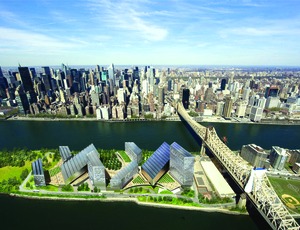
New York City is on its way to becoming the "world's capital of technological innovation" with the selection of Cornell University and its partner Technion-Israel Institute of Technology to build a state-of-the-art applied sciences campus, says NYC Mayor Michael Bloomberg. The Cornell-Technion team's proposal for an 11-acre, $2-billion-plus campus on Roosevelt Island beat out several other proposals under the mayor's Applied Sciences NYC initiative, which aims to boost the city's global technological competitiveness, create jobs and generate revenue.
"By adding a new state-of-the-art institution to our landscape, we will educate tomorrow's entrepreneurs and create the jobs of the future," the mayor said in announcing the winning bid on Dec. 19, 2011.
The city says it is also in talks with other partnerships including Carnegie Mellon, Columbia and a New York University-led consortium—all of which placed bids for the applied sciences initiative—regarding other possible science and engineering projects.
Under Applied Sciences NYC, the Cornell-Technion team plans to build a 2-million-sq-ft campus by 2043 that will be its home. The campus will include 500,000 sq ft of green space open to the public, a solar array and four acres of geothermal wells. Plans include building an offsite location in 2012, prior to the start of construction of the Roosevelt Island campus.
The first phase of the Roosevelt Island campus is expected to break ground by the beginning of 2015 and be completed by 2017. The campus is expected to have expanded to more than 1.3 million sq ft by 2027. The campus also will include a 150,000-sq-ft building that aims to be the largest net-zero energy building in the eastern U.S. and among the top-four largest in the country.
The campus, designed by Skidmore, Owings & Merrill in New York City, will cover three interdisciplinary hubs: connective media, healthier life and the built environment. Cornell will immediately offer master and doctoral degrees in areas including computer science; electrical and computer engineering; and information science and engineering.
The mayor's office says the partnership was selected because of the large scale and vision of its proposal; its financing capacity; its focus on collaboration between academia and the private sector; its ability to execute the project; and the track records of both Cornell and Technion in generating applied science breakthroughs and of spinning out new businesses.
The project will soon move into the environmental and land use review stage. The review is expected to be completed by fall of 2013.
The Cornell-Technion team will develop and own the campus and assume financial responsibility for its establishment and operations. The partnership will receive $100 million in city funding to help with building and related costs and have access to city land under a 99-year lease with the option to purchase the land for $1.
Cornell received a $350-million donation from The Atlantic Philanthropies to support the initiative. It was the largest contribution in the university's history.
According to a New York City Economic Development Corp. study, the campus will generate more than $7.5 billion and more than $23 billion in overall economic activity over the next three decades.
The study also forecasts that the campus will generate $1.4 billion in total tax revenue. The project is expected to create about 20,000 construction and 8,000 permanent jobs.
Stanford University withdrew its $2.5-billion bid to build a Roosevelt Island campus in mid-December. The Palo Alto, Calif.-based university had proposed a 1.9-million-sq-ft graduate-level teaching and research campus.

Post a comment to this article
Report Abusive Comment